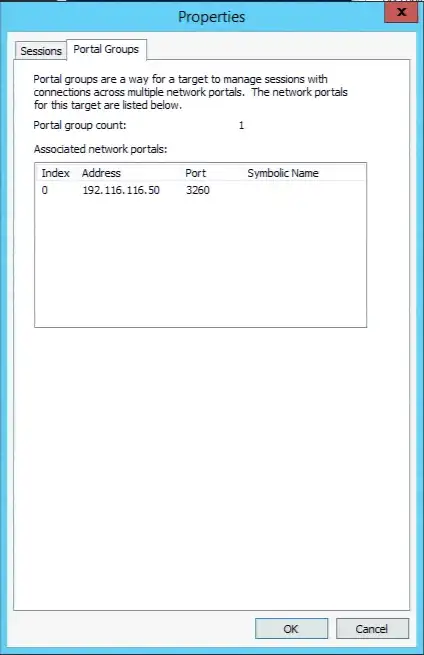I am working on a migration from a VMware vSphere environment to a Hyper-V Cluster utilizing Windows Server 2012 R2. The setup is pretty small, an EqualLogic PS6100e and two Dell PowerConnect 5424 switches and handful of R710s and R620s. The SAN was configured as a non-RFC1918 network that is not assigned to our organization and since I am working on building a new virtualization environment I figured that this would be an appropriate time to do a subnet migration.
I configured a separate VLAN and subnet on the switches and the two previously unused NICs on the PS6100's controllers. At this time I only have a single Hyper-V host cabled in but I can successfully ping the PS6100 from the host. From the PS6100 I can ping each of the four NICs that currently on the storage network.
I cannot connect the Microsoft iSCSI Initiator to the Target. I have successfully added the Target Portals (the IP addresses of PS6100 NICs) and the Targets are discovered but listed as inactive. If I try to Connect to them I get the following error, "Log onto Target - Connection Failed" and ISCSIPrt 1 and 70 events are recorded in the Event Log. I have verified that access control to the volume is not the problem by temporarily disabling it.
I suspect the problem is with the Portal Group IP address which is still listed as Group Address of old subnet (I know, I know I might be committing the sin of the X/Y problem but everything else looks good):

RFC3720 has this to say about Network Portal and Portal Groups:
Network Portal: The Network Portal is a component of a Network Entity that has a TCP/IP network address and that may be used by an iSCSI Node within that Network Entity for the connection(s) within one of its iSCSI sessions. A Network Portal in an initiator is identified by its IP address. A Network Portal in a target is identified by its IP address and its listening TCP port.
Portal Groups: iSCSI supports multiple connections within the same session; some implementations will have the ability to combine connections in a session across multiple Network Portals. A Portal Group defines a set of Network Portals within an iSCSI Network Entity that collectively supports the capability of coordinating a session with connections spanning these portals. Not all Network Portals within a Portal Group need participate in every session connected through that Portal Group. One or more Portal Groups may provide access to an iSCSI Node. Each Network Portal, as utilized by a given iSCSI Node, belongs to exactly one portal group within that node.
The EqualLogic Group Manager documentation has this to say about the Group IP Address:
You use the group IP address as the iSCSI discovery address when connecting initiators to iSCSI targets in the group. If you modify the group IP address, you might need to change your initiator configuration to use the new discovery address
Changing the group IP address disconnects any iSCSI connections to the group and any administrators logged in to the group through the group IP address.
Which sounds equivalent to me (I am following up with support to confirm). I think a reasonable explanation at this point is that the Initiator can't complete the connection to the Target because the Group IP Address / Network Portal is on a different subnet.
I really want to avoid a cutover and would prefer to run both subnets side-by-side until I can install and configure each Hyper-V host.
Question/s:
- Is my assessment at all reasonable?
- Is it possible to configure multiple Group IP Addresses on the EqualLogic PS6100? I don't want to just change it as it will disconnect the remaining ESXi hosts.
- Am I just Doing It Wrong(TM)?